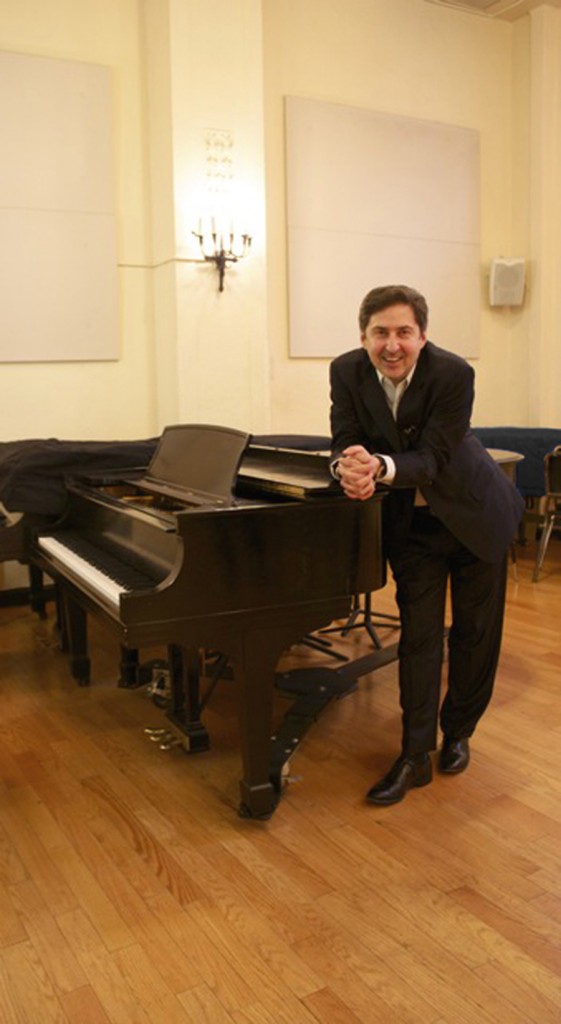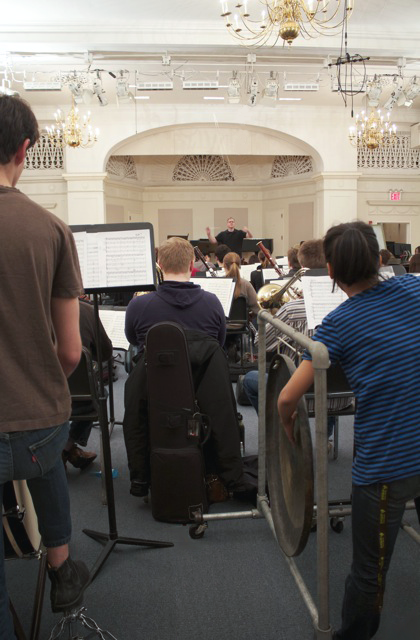Richard Kessler had not ordered coffee, but he was the most animated customer at the O Café on Sixth Avenue as he discussed his vision for the future of Mannes College. When Kessler came to the school last year — to become its third dean since Mannes joined The New School in 1989 — he brought a host of ideas to energize and revamp one of the oldest and most esteemed conservatories in the country. Six months into his tenure, Kessler concedes that he has scarcely started, but his mission remains the same: to rouse Mannes from its sleepy, decades-long torpor.

Like many classical conservatories, Mannes adheres to a traditional curriculum, and is particularly well-known in the music world for a rigorous emphasis on music theory and ear training. But with just 200 undergraduate students and 160 faculty members, only 15 of whom are full-time, the school remains largely isolated; for most, the Mannes experience is confined to studios and practice rooms on the Upper West Side.
Kessler is determined to change that. He plans to overhaul the curriculum and incorporate new classes in community engagement, business and communications — practical skills that the new dean believes are necessary for today’s musicians to succeed. And while some students and faculty worry that these changes will endanger the school’s reputation, many share in Kessler’s excitement about the possibility of transforming Mannes from a traditional bastion into a modern-day conservatory.
“Kessler is redefining what the well-rounded musician would look like,” said Ashlee Miller, a graduate clarinet student. “It’s going to be completely different from the traditional idea of a conservatory. It’s broadening it and radicalizing it. And I don’t think any other conservatory is going to be able to compare their curriculum to his.”
*****
The New School’s decision to hire Kessler sent a clear signal: It was a radical departure from the ways of the past. Since 1916, when violinist David Mannes founded the school with his wife, pianist Clara Damrosch Mannes, the conservatory has hewed to a singular pedagogical goal: Mannes students learn not only how to play music, but how to understand it. Most are required to study music theory, ear training and dictation for four years — almost twice as long as students at other conservatories.
“The curriculum is heavy, but it’s also world-renowned,” said Frank Nemhauser, who has been a faculty member at Mannes since 1975. “It’s tried and true. We’ve been doing it for a long time to great success.”
Nemhauser, who also received his bachelor’s degree from Mannes and has held a number of administrative positions at the school, acknowledged that the music world has changed. But he also maintains that musicians need a solid grounding in the basic canon of classical music. Administrators and faculty have long lauded Mannes for providing this, and are insistent upon preserving the school’s traditions.
“I wouldn’t want to see the core curriculum changed,” said Elizabeth Aaron, a Mannes alumna who has been on the faculty since 1957. “It’s lasted since 1916, and I think as long as we want to be competitive with other music schools, we have to keep doing it.”
But Kessler has little intention of following the same familiar patterns. An accomplished trombonist, with both a bachelor’s and a master’s degree in music from Juilliard, he said that he understands the importance of music theory and ear training, but believes Mannes needs to shift its focus.

“Students have come to me and said that they want things we don’t provide. If you graduate from Mannes and you don’t have the skills to be a successful artist, that’s problematic,” Kessler said. “I’m not interested in maintaining tradition for tradition’s sake.”
Unlike his predecessors, Kessler has spent much of his career working as an arts administrator in the public sphere. From 2004 to 2011, he ran the Center for Arts Education, a non-profit that attempts to bring the arts to public schools across New York City. In the 1990s, he worked at organizations like the American Music Center, which provides services and information about new American music, and Artsvision, an arts education consulting company. For Kessler, being an artist means more than performing — he believes that musicians play an important role in society, and that Mannes students should learn how to use their skills for the public good.
“One of the best things about art is the ways in which it helps to reflect the world around you, to interpret the world around you,” he said. “We don’t only need artists on the stage. We need artists involved in community dialogue and community conversations.”
Kessler wants to bring this kind of involvement into the core curriculum so that students gain experience teaching and working in local communities. He also hopes that these “New School values” will foster a more dynamic relationship between Mannes and the rest of the university, and wants to work with other divisions to create a teaching artist degree. While he hasn’t met with faculty to discuss these plans yet, many agree that hands-on experience would be beneficial for students.
“This could make our young musicians think about what music actually is and how to make their performances speak to people who may not have any background in it,” said Thomas Bagwell, who graduated from Mannes in 1994 and has taught at the college since 1998. “Teaching and doing more extensive outreach could be good for everyone involved.”
The vision extends beyond music: Business classes are also on Kessler’s agenda. Musicians today often need to manage their own careers, market themselves and raise their own funds, Kessler said. In addition to requiring basic business classes for all students, he hopes to collaborate with Milano on a new degree program that would enable students to receive a bachelor’s of music and a master’s of arts administration.
“You’ll get hired for being a great musician, but it’s helpful to be able to navigate contracts and all that stuff,” said Deanna Breiwick, who graduated from Mannes in 2009 and is now pursuing a graduate degree at Julliard.
Since graduating, Breiwick said she has encountered a number of real-world realities that Mannes didn’t prepare her for — she had to learn it on her own.
“It would be very helpful to have a class that laid down the basics and the tools, career-wise,” she said. “It would be beneficial to creating the complete artist.”
Other music conservatories have also begun adapting to today’s art world. Since 2001, the Eastman School of Music, the Juilliard School and the Manhattan School of Music have all launched extracurricular programs that teach leadership and entrepreneurial skills. But Kessler doesn’t think extracurricular is enough. Instead, he wants to completely reimagine the classical music education.
“In some ways, this is an experiment. I think we will be pioneering,” he said. “But my feeling is that the mix of divisions at The New School is just the right mix for this kind of thing — to enable a traditional conservatory to become a very heavily, almost radical 21st-century place.”
*****
For now, Kessler’s ideas for Mannes remain just that — ideas. Over the next few months, he will begin meeting with faculty to discuss how to implement his plans, and no changes will take place until at least the fall of 2013, he said. But word of Kessler’s proposals has already sparked debate within the Mannes community.
“The dean has some excellent ideas. They’re new and fresh,” said Elizabeth Aaron. “We’re very open to new ideas and programs, keeping in mind that our main competition is Juilliard and Manhattan School of Music.”
Like many students and faculty, Aaron believes that the core curriculum should remain the same. Although most agree that students would benefit from new programs, they don’t want the school to lessen its emphasis on music theory and technique.
“Practical skills are important, but somewhat meaningless if you don’t have the talent, technical stability, and musical knowledge,” said Avery Amero, a junior vocal student. “To cut the theory program would do irreparable damage to the school’s reputation, not to mention diminishing the quality of the musicians Mannes produces.”
But many students have welcomed Kessler’s enervating energy. They argue that, in addition to improving the education at Mannes, overhauling the curriculum would enliven the claustrophobic Mannes community.
“It’s an incestuous mix of people who have been at Mannes for so long,” said Hajir Sailors, a senior vocal student and Mannes’s representative in the University Student Senate. “They are all in a bubble. And four years after they start school, students come out of the door and say, ‘Okay, what do I do next?’”
The debate over the future of Mannes has only just begun. And while dissenters, if not dissension, will emerge, Kessler strongly believes that his plans will take the conservatory in a better direction.
“I think you have to take some risks,” he said. “Nothing is ever gained without risk. I’m willing to take a risk and say, ‘Let’s try it.’ Let’s blow up some of the things that we’ve done the same way for many, many years. And let’s see what happens.”
With reporting by David Fabe & Jill Heller







I just like the helpful information you supply to your articles.
I’ll bookmark your blog and check once more here
regularly. I am relatively certain I’ll be informed many new stuff right
here! Good luck for the next!
I loved as much as you’ll receive carried
out right here. The sketch is tasteful, your authored material stylish.
nonetheless, you command get got an impatience over that you
wish be delivering the following. unwell unquestionably come further formerly again as exactly the same nearly very often inside case you shield this increase.
Hi there, yeah this post is genuinely nice and I have learned lot of things from it about blogging.
thanks.
hello!,I like your writing so much! share we communicate
more about your post on AOL? I need an expert on this house to resolve my problem.
May be that is you! Having a look ahead to look you.
Howdy! Someone in my Myspace group shared this site with us so I came to take a
look. I’m definitely loving the information. I’m bookmarking and
will be tweeting this to my followers! Terrific blog and superb design and style.
Awesome post.